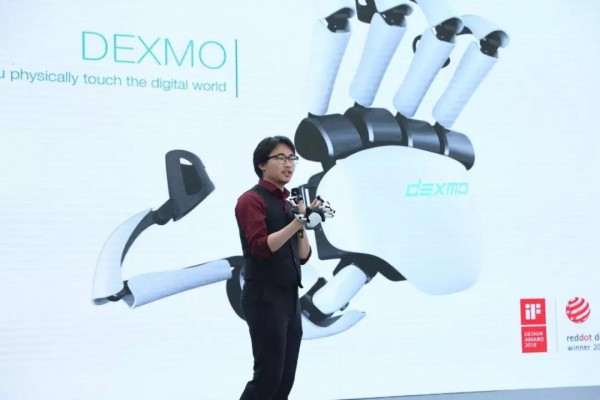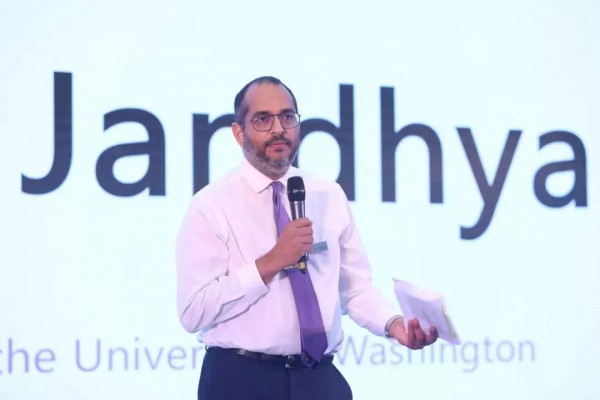Contestants, judges and guests of the final round of the 2018 GIX Innovation Competition pose in Tsinghua TusPark, Beijing, on Aug 26.
The final round of the GIX (Global Innovation Exchange) Innovation Competition, a partnership between Tsinghua University and the University of Washington (UW), took place at the Garden Lobby of TusPark in Beijing on Aug 26.
The 2018 competition called on university students and young innovators to showcase their original "connected devices" projects, covering areas such as the Internet of Things (IoT), wearable devices, intelligent hardware, virtual reality (VR), augmented reality (AR), ubiquitous computing, intelligent sensors, natural interactions and related applications in various fields.
Team Mooyee Technology won the first prize for its Air Faucet System. The second prizes went to three projects—DEXMO, Small Cluster Underwater Robot Design with Variable Pitch Propeller and FocuSTAR. Aegis AI, RoboDog and other five teams ranked in the third place.
"First launched in 2016, GIX has been stimulating passion for technological innovation among young talents across the world and attracting ambitious innovators to join our team-based programs," noted Yang Bin, vice-president of Tsinghua University, when addressing the final.
"This year, we've not only received applications from more than 50 top universities around the world, but in more diverse fields—fintech was added as a special track based on connected devices." Yang added.
"With the sponsorship of Microsoft, we carried out semi-finals in four cities and set up an online advisor panel which gives final contestants convenient access to a group of experts who provide advice on both technical matters and start-up challenges." Many of the final contestants focused on practical issues and industry trends. They designed and developed impactful solutions in rising sectors, including education, environmental protection, healthcare, transportation, fitness, entertainment, information accessibility and more.
The winning Air Faucet System upends traditional methods of water utilization with an independently developed low-pressure high-efficiency atomization device. It can save water at a rate of up to 90 percent while still providing high-quality cleaning and a comfortable user experience.
One of the second-place teams, from the University of Electronic Science and Technology of China in Chengdu, Sichuan province, created the FocuSTAR project—a positioning system used for autonomous driving on public roads. The system allows vehicles to dissolve and receive location information for themselves and other vehicles instantly, with unlimited system capacity.
Another second-place team introduced DEXMO, a light full hand force feedback exoskeleton, which captures all hand motions and provides virtual force feedback. It can be used in various scenarios, including virtual training situations for operating theaters, nuclear power plants, or space stations, as well as virtual assembly lines, medical rehabilitation, or social VR and gaming.

DEXMO, a light full hand force feedback exoskeleton, is displayed during the road show in TusPark on Aug 26.
Third-prize winner, the team from Chicago and Seattle also brought their project Aegis AI, which employs computer vision to automatically detects guns in existing security camera feeds, then notifies the police and provides early warnings to building occupants. With further development, the design could greatly reduce gun violence in many countries.
"The final competition and road shows made up a live show of innovators' dream," said Deng Feng, founder of Northern Light Venture Capital. He praised the contestants on behalf of the nine-judge panel, "I am very glad to see that innovators are pioneering in the right direction."
The competition is held annually and organized by GIX at Tsinghua University. This year's event was sponsored by Youxin Financial, TusStar and Meituan-Dianping.
Vikram Jandhyala, vice-president of the University of Washington, Shi Yuanchun, dean of GIX at Tsinghua University, and Shwetak Patel, CTO of GIX, attended the event.
"Seeing this many impressive ideas from very talented students from all over the world makes us excited about the future," said Vikram in his closing speech.
Underlining the importance of global innovation, he said that "It is truly heartening to see such a global collaboration at a time when the world needs it. The event added to our belief that innovations come from everywhere."
With more attention and cooperation from society, GIX will become a good model for global collaboration that we need now more than ever, according to Vikram.

Vikram Jandhyala, vice-president of the University of Washington, delivers a closing speech in TusPark, Beijing, on Aug 26.
Link: http://www.chinadaily.com.cn/m/beijing/zhongguancun/2018-09/06/content_36875650.htm

